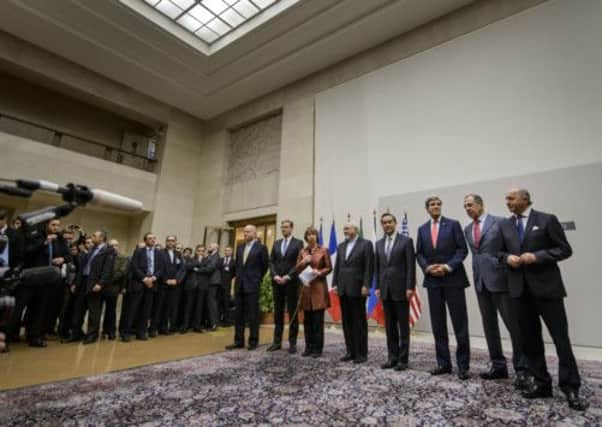‘Power of diplomacy’ secures nuclear deal with Iran


He said the deal, struck after lengthy negotiations in Geneva, was an “important first step” and “demonstrates how persistent diplomacy and tough sanctions can together help us to advance our national interest”.
He insisted sanctions would continue to be enforced “robustly” in order to secure a comprehensive final deal with Iran.
Advertisement
Hide AdAdvertisement
Hide AdIsrael has condemned the deal, and Foreign Secretary William Hague acknowledged that critics of the agreement had “legitimate concerns”.
But he insisted the “first-step deal [should] give us faith in the power of diplomacy” following a fundamental change in Iran’s attitude.
Under the terms of the deal, Iran agreed to halt progress on key elements of its nuclear programme in exchange for modest relief from certain economic sanctions. These include unfreezing of some assets and suspending some sanctions on items such as petrochemicals, gold and precious metals.
In return, Iran will have to carry out actions including stopping the enrichment of uranium above a level of 5 per cent and the elimination of the stockpile of uranium above that level that it has already built up, as well as stopping work on its heavy water reactor at Arak.
Israel’s premier Benjamin Netanyahu described the deal as a “historic mistake” and said the international community had given up too much to Iran.
Speaking to his cabinet, he said Israel was not bound by the deal and reserved the right to defend itself – a reference to possible military action against Iran.
“Today the world became a much more dangerous place because the most dangerous regime in the world made a significant step in obtaining the most dangerous weapons in the world,” he said.
Mr Hague said he understood the scepticism of Israel and Saudi Arabia about Iran’s commitment to the process. He said: “They do all have very legitimate concerns about Iran’s nuclear programme and it’s not surprising that people will be sceptical about any agreement. After all, Iran also has a history of not revealing the truth about its nuclear programme to the rest of the world.
Advertisement
Hide AdAdvertisement
Hide Ad“But this is the first time that Iran has entered into an agreement with other nations, with the international community, about what to do about its nuclear programme.”
Negotiators from the UK, US, France, Germany, Russia and China had been in talks with Iran since last Wednesday and a deal was announced in the early hours of yesterday following, the arrival in Geneva of key figures including Mr Hague and US secretary of state John Kerry.
Mr Kerry said a “team effort” had secured the deal, but “now the really hard part begins”, adding: “That is the effort to get the comprehensive agreement which will require enormous steps in terms of verification, transparency and accountability.”
US president Barack Obama said the deal, which he called “just a first step”, included “substantial limitations” on Iran, cutting off its ability to make a nuclear bomb.
Analysis: Why Israel and many Gulf Arab states fear a thaw in Tehran’s relations with the West
The Iran nuclear programme deal could tilt the balance of power in the Middle East towards Tehran after two years of popular revolts that have weakened leading Arab nations.
The deal opens the way for a thaw in a US-Iranian confrontation that has lasted almost as long as the Cold War, alarming Israel and Gulf Arab rulers who fear a new regional hegemon hostile to their interests. It has implications beyond weapons proliferation in a war-scarred region critical to world oil supplies.
For some Gulf Arab states, which see Tehran as a regional troublemaker, and for Israel, which regards Iran as a mortal threat, the agreement means they have failed to dissuade Washington from a course they suspect will end in tears.
Advertisement
Hide AdAdvertisement
Hide AdCritics say Iran will grow richer and stronger through the easing and eventual lifting of sanctions that have shackled its economy, emboldening its Islamist rulers to step up support to Shiite Muslim allies in Arab countries. In contrast, supporters of the accord say a rapprochement between two powers so long at odds could help stabilise a region in turmoil and reduce sectarian strains that have set Shiite and Sunni Muslims bloodily against each other.
Rami Khoury, of the American University of Beirut, described the interim deal restricting Iran’s nuclear work as a “very good thing” that could eventually lead to rapprochement between Tehran’s clerical rulers and US-allied Gulf Arab states.
At the heart of Gulf Arab concerns is a belief that the moderate Iranian officials who negotiated the deal are not the hard men in charge of what they see as Shiite meddling in Sunni Arab countries. Those forces remain dominant in the Revolutionary Guard and intelligence services. Gulf Arabs cite as a prime example Iranian support for Syrian president Bashar al-Assad, a member of a sect that is an offshoot of Shiite Islam, who has waged a two-and-a-half-year war against mostly Sunni rebels backed in part by Gulf Arabs.
A senior Gulf Arab official close to Saudi government thinking said its attitude continued to be characterised largely by “suspicion”, based on Iranian involvement in Syria, Yemen and Bahrain. “The atomic arsenal is not their only arsenal – it is the mischief arsenal they have that worries us,” he said.
The disclosure that senior US officials held secret talks with Iran to prepare for the nuclear agreement may exacerbate Gulf Arab rulers’ fears that Washington is willing to go behind their backs to do a deal.
Many Gulf Arabs suspect the commercial imperatives that have driven decades of US engagement with them are similar to those driving US outreach to Iran – business.
• Analysis by William Maclean